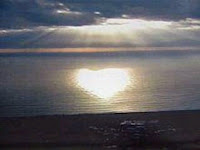In a study, at a hospital, prayer groups were
simply given the patients’ first names, with brief descriptions of their
problems. They were asked to pray each day until the patient was discharged - but
were given no instructions on how to do it or what to say.
When the study was completed ten months later,
the prayed-for benefited in several significant areas: They were five times
less likely to require antibiotics; and they were two and a half times less
likely to suffer congestive heart failure or cardiac arrest.
If the medical technique being studied had been
a new drug or surgical procedure instead of prayer, it would probably have been
heralded as a breakthrough. Even hardboiled sceptics, who question the validity
of faith healing, acknowledge: “If this is a valid study, we doctors ought to
be writing on our prescription charts, ‘Pray three times a day.’ If it works,
it works.”
Scientists, including doctors, can have blind
spots. The power of prayer seems to be one of them. There are studies that
suggest that prayer can have a beneficial effect on high blood pressure,
wounds, headaches and anxiety. Results occurred not only when people prayed for
explicit outcomes but also when they prayed for nothing specific. Some studies
showed that a simple “Thy will be done” was quantitatively more powerful than specific
results held in mind. In many experiments a simple attitude of prayerfulness - an
all-pervading sense of holiness and a feeling of empathy, caring and compassion
- seemed to set the stage for healing.
The power of love is legendary. It’s built into
folklore, common sense and everyday experience. Love moves the flesh - as the
blushing and palpitations experienced by lovers attest. And throughout history
tender, loving care has been recognized as a valuable element in healing. In
fact, a survey of men with heart disease published in The American Journal of Medicine found a reduction of
close to 50 per cent in frequency of angina in those who perceived their partners
as supportive and loving.
Virtually all healers who use faith and prayer
agree: love is the power making it possible for them to reach out to heal, even
at a distance. The feeling of care and warmth is so pronounced that they
usually describe “becoming one” with the person being prayed for. In healer
Agnes Sanford’s words, “Only love can light the healing fire.”
As a Sunday-school-attending youth we were
always advised to “pray unceasingly.” I was old enough to realize that ‘unceasingly’
means non-stop. Yet try as I might, I was not capable of non-stop prayer, and
my attempts in bed at night would always succumb to sleep. At the time I had no
idea that “subconscious” prayer was possible.
Today
we equate prayer almost exclusively with waking awareness and rationality. The concept that prayer may occur
in the depths of the unconscious, even
during dreams, may seem preposterous. And the possibility that our
unconscious may know how to pray better than
our conscious mind is not entertained.
A
foremost medical practitioner and researcher studying the health benefits of
prayer and meditation found that
among Christians, Muslims and Jews
who prayed regularly, their various ‘chants' were equally effective in
stimulating healthy physiological changes in the body - what he called the “relaxation response.” Also
discovered was a connection between exercise and prayer. Runners taught to
meditate as they ran, found that their bodies became more efficient.
The research showed not only that prayer is
good for the body, but also that our methods of prayer vary widely. Prescribing
one, specific way to pray can disenfranchise people from the prayer process and
result in prayer dropouts.
Most people who pray are convinced that prayer
can be used in a purposeful, goal-specific manner. But research shows that
open-ended entreaties seem to work too. Invocations such as “Let it be” or “May
the best thing happen” do not “use” prayer for specific outcomes, nor do they
involve complicated messages. Perhaps this is what some mean when they
advocate, “Let go and let God.” Many recognize in their prayers a spontaneous,
uncontrollable quality that brings results.
I remember a neighbour dying. A day before, I sat at his bedside with his mother
and brother. He knew he had little time left, and he chose his words carefully,
speaking in a hoarse whisper. Although he was not a religious person, he
revealed to us that he had recently begun to pray. “What do you pray for?” I asked. “It isn’t ‘for’ anything,” he said thoughtfully. “It simply reminds me that I am not alone.”
Prayer is like that. It is a reminder of our unbounded nature, of the part of us that is infinite in space and time. It is the universe’s affirmation that we are not alone.



No comments:
Post a Comment